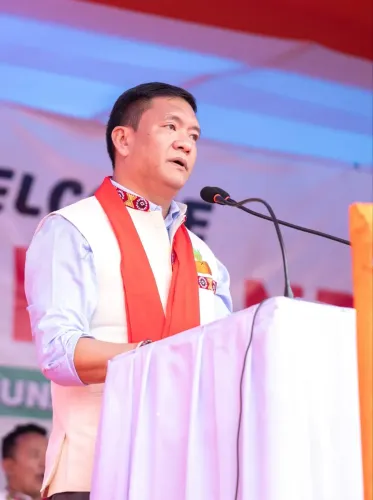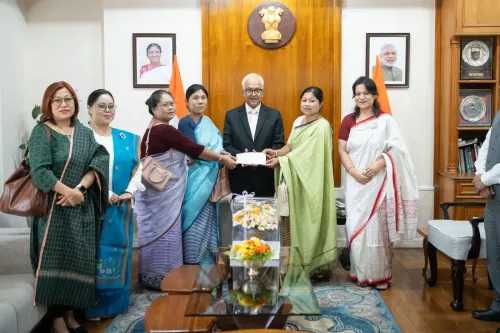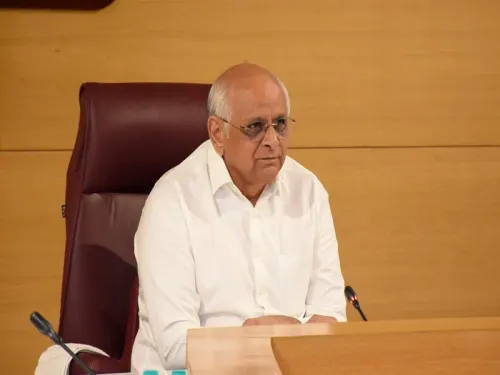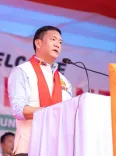Is the Great Nicobar Project a Threat to Tribals and Ecology?
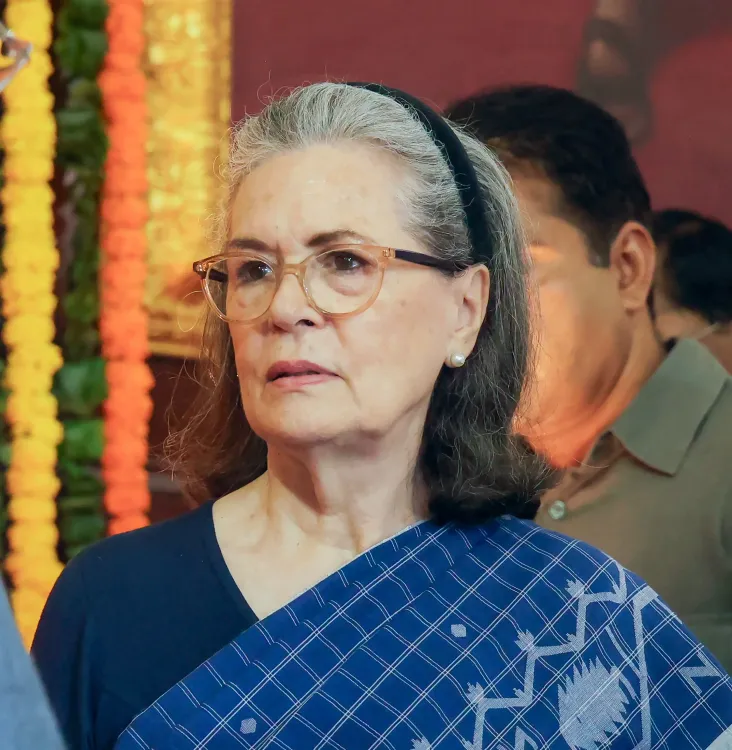
Synopsis
Key Takeaways
- Sonia Gandhi's critique highlights serious concerns over tribal rights.
- The project poses existential risks to indigenous communities.
- Significant ecological damage is anticipated from deforestation.
- Consultation with indigenous groups has been lacking.
- Seismic vulnerability of the region raises additional concerns.
New Delhi, Sep 8 (NationPress) Congress Parliamentary Party (CPP) Chairperson Sonia Gandhi has sharply condemned the Central Government's Great Nicobar Island Project, labeling it a "grave misadventure" that disregards tribal rights, compromises legal processes, and endangers one of the nation’s most vulnerable ecosystems.
In her opinion piece titled 'The making of an ecological disaster in the Nicobar' featured in a prominent newspaper, Gandhi cautioned that the "collective conscience cannot and must not remain silent when the very existence of the Shompen and Nicobarese tribes is jeopardized."
"Our duty to future generations must not allow this widespread devastation of a unique ecosystem. We are compelled to voice our dissent against this injustice and betrayal of our national principles," she stated.
Criticizing the Central Government, Sonia Gandhi, who is also a Congress Rajya Sabha member, alleged that there has been no shortage of "poorly thought-out and ill-conceived policymaking over the past 11 years."
"The most recent of these misguided efforts is the Great Nicobar mega-infrastructure project. The misplaced expenditure of Rs 2,72,000 crore poses a life-threatening risk to the island's indigenous tribal communities, jeopardizes one of the world's most unique ecosystems, and is highly vulnerable to natural disasters. Yet, it is being insensitively advanced, mocking all legal and deliberative processes," she remarked.
She underscored that the island is home to two indigenous groups—the Nicobarese and the Shompen, the latter being particularly vulnerable.
Sonia Gandhi indicated that the Nicobarese, who were already displaced by the 2004 Tsunami, are at risk of permanent displacement from their ancestral homes, while the Shompen face threats to their forest habitat and cultural identity.
"Ultimately, the Shompen will find themselves severed from their ancestral lands and unable to maintain their social and economic livelihoods," she warned.
The CPP Chairperson also accused the government of ignoring constitutional and statutory protections.
"According to Article 338-A of the Constitution, the Government should have consulted the National Commission for Scheduled Tribes. This has not occurred. The Government was also obligated to consult the Tribal Council of Great Nicobar and Little Nicobar Island. Instead, the plea from the Council Chairman for Nicobarese members to return to their ancestral homes has been disregarded," she explained, adding that even the Council's no-objection letter was "rushed" and subsequently revoked.
She argued that the Social Impact Assessment (SIA) conducted under the 2013 Land Acquisition Act had "completely overlooked" the Nicobarese and Shompen as stakeholders. Furthermore, she noted that the Forest Rights Act (2006), which empowers the Shompen to manage their forests, was ignored.
Raising significant ecological concerns, Sonia Gandhi stated that the project would lead to the deforestation of a large area.
Citing estimates from the Ministry of Environment, Forests, and Climate Change, she mentioned that 8.5 lakh trees might be cut down for this project, which is a "depressing figure" that may also be a "gross underestimate." She pointed out that independent assessments suggest that 32 lakh to 58 lakh trees could ultimately be felled.
Dismissing the compensatory afforestation strategy, Sonia Gandhi remarked, "Inexplicably, the planned afforestation is in Haryana, a state thousands of kilometers away with a different ecology. In a farcical tragedy, a quarter of this land earmarked for afforestation has been auctioned off by the Haryana Government for mining."
She further noted that part of the proposed port site is located in CRZ 1A, an area where construction is banned due to turtle nesting sites and coral reefs.
"Despite overwhelming evidence confirming this, including a National Green Tribunal ruling, the Government has found ways to manipulate this fact through a high-powered committee," Sonia Gandhi claimed, adding that the committee's report has not been disclosed to the public.
Sonia Gandhi also brought attention to concerns raised by primatologists regarding the Nicobar long-tailed macaque and criticized the biodiversity evaluations, asserting they were conducted under unsatisfactory conditions.
"The assessment of sea turtle nesting sites was conducted in the off-season. Drones were utilized to monitor dugongs, but this method can only assess shallow waters. Agencies were compelled to conduct these evaluations under highly unusual conditions, bordering on coercion," she stated.
Stressing the seismic vulnerability of the island, the CPP chief said, "Finally, the project—including the port—is being developed in a seismically sensitive, earthquake-prone area... Placing such a massive project here deliberately endangers investments, infrastructure, people, and ecology."
The initiative, dubbed Holistic Development of Great Nicobar, spans over 160 sq km and encompasses a transshipment port, international airport, township, and power plant.

